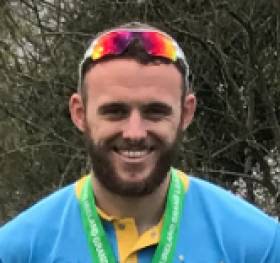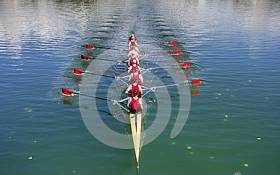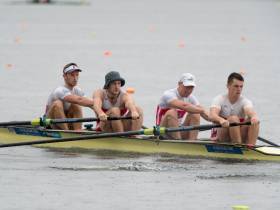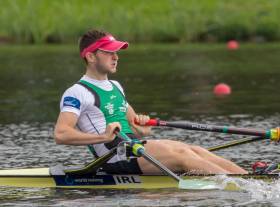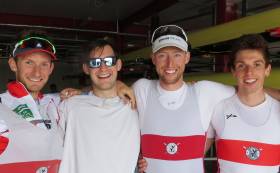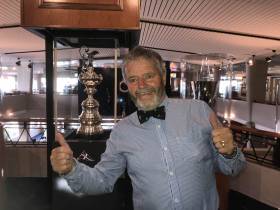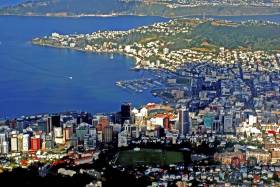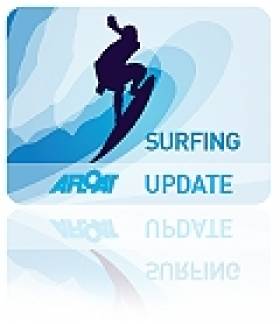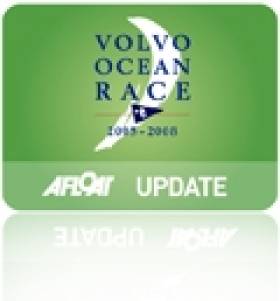Displaying items by tag: New Zealand
Murphy Adds Gold in New Zealand
#Rowing: Max Murphy added a gold medal to the silver he had won in the men’s senior pair at the New Zealand Rowing Championships today. The UCD oarsman was part of the Waikato senior eight which were clear winners, beating a crew from their own club into second. Kevin Neville and Eamon Power of NUIG were in the Wellington crew which took bronze.
In warm and calm conditions, Paul O’Donovan and Gary O’Donovan finished fourth in the Premier double sculls, an elite event won by Chris Harris and Robbie Manson.
New Zealand Rowing Championships, Lake Karapiro, Day Four (Irish interest)
Men
Eight – Senior
Final: 1 Waikato (3 M Murphy) 5:56.41; 3 Wellington (7: K Neville; 8 E Power) 6:00.28.
Pair - Senior
Final: 2 Waikato (M Murphy, T Bedford) 6:59.41.
Sculling,
Double – Premier
Final: 4 Skibbereen (P O’Donovan, G O’Donovan) 6:38.66. Senior – B Final: 1 Wairau (2 K Neville) 6:46.04.
Single – Club
B Final: 5 Wairau (E Power) 8:11.15.
Neville Competes in Two New Zealand Semi-Finals
#Rowing: Kevin Neville competed in two semi-finals at the New Zealand Rowing Championships on Thursday. The NUIG man, competing for Wairau, finished sixth in the senior single sculls and fifth in the senior double. He is set to compete in B Finals. In the club singles semi-final, Eamon Power finished eighth and is also bound for a B Final.
New Zealand Rowing Championships, Lake Karapiro, Day Three (Irish interest)
Men
Sculling, Double – Senior - Semi-Final One (First Four to A Final; rest to B Final): 5 Wairau (2 K Neville) 6:56.17.
Single – Senior - Semi-Final Two (First Four to A Final; rest to B Final): 6 Wairau (K Neville) 8:08.97.
Club – Semi-Final One (First Four to A Final; rest to B Final): Wairau (E Power) 8:05.86.
Paul O'Donovan and Skibbereen Four Win Place in New Zealand Finals
#Rowing: Paul O’Donovan, in the Premier (open weight) single sculls, and the Skibbereen four both made it to A Finals at the New Zealand Rowing Championships. O’Donovan won in a repechage to join some of the top heavyweight single scullers in the world in the final. Gary O’Donovan took third in the race and will compete in the B Final.
The two brothers joined Mark O’Donovan and Shane O’Driscoll to form a four which won its repechage and will also compete in a final with top heavyweight crews.
Mark O’Donovan and Shane O’Driscoll took fifth in their repechage of the Premier Pair and missed out on the final, while Max Murphy made it through to the A Final of the men’s pair and NUIG’s Kevin Neville and Eamon Power progressed through repechages in the senior single and club single respectively.
New Zealand Rowing Championships, Lake Karapiro, Day Two (Irish interest)
Men
Four – Premier
Repechage Two (First two to A Final; rest to B Final): 1 Skibbereen (G O’Donovan, P O’Donovan, M O’Donovan, S O’Driscoll) 6:21.39.
Pair – Premier
Repechage (Top Four to Final; rest eliminated): 5 Skibbereen (S O’Driscoll, M O’Donovan) 7:11.47.
Senior
Repechage (Top Three to Final): 2 Waikato (M Murphy, T Bedford) 7:33.13.
Sculling,
Single – Premier
Repechage One (First two to Final; rest to B Final): 1 Skibbereen (P O’Donovan) 7:23.32; 3 Skibbereen (G O’Donovan) 7:55.63.
Senior
Repechage Three (First Two to Semi-Final): 2 Wairau (K Neville) 7:29.91.
Club
Repechage One (First Two to Semi-Final): 1 Wairau (E Power) 8:19.07.
Ireland Pair in Tight Finish in New Zealand
#Rowing: Mark O’Donovan and Shane O’Driscoll were eliminated from the Premier Pair at the New Zealand Rowing Championships on Wednesday (local time). The world lightweight pairs champions knew they would have some tough races as they learnt their trade in the heavyweight ranks, and this was one. In a tight repechage, rowed into a headwind, the Skibbereen men lost out by 1.64 seconds a three-way battle for the crucial third and fourth places which guaranteed a slot in the final.
Max Murphy secured a place in the final of the men’s senior pair, as his Waikato crew finished second in a repechage, while Eamon Power won his repechage of the club single sculls to secure a place in the semi-finals.
New Zealand Rowing Championships, Lake Karapiro, Day One (Irish interest; selected results)
Men
Pair – Premier - Repechage (Top Four to Final; rest eliminated): 5 Skibbereen (S O’Driscoll, M O’Donovan) 7:11.47.
Senior - Repechage (Top Three to Final): 2 Waikato (M Murphy, T Bedford) 7:33.13.
Sculling, Single – Club – Repechage One (First Two to Semi-Final): 1 Wairau (E Power) 8:19.07.
Paul O'Donovan and Max Murphy Impress in New Zealand
#Rowing: Paul O’Donovan was the pick of the Irish internationals at the testing New Zealand Rowing Championships on Lake Karapiro on Tuesday. O’Donovan finished third in his heat of the Premier (openweight) single sculls – just .11 of a second behind the winner of the other heat, Mahe Drysdale, the Olympic champion. O'Donovan will get a second chance to make the final through the repechages.
The pair of Mark O’Donovan and Shane O’Driscoll took fourth in their heat, while a four with the three O’Donovans and O’Driscoll also conserved energy for Wednesday’s repechages. The double of Paul and Gary O’Donovan took part in a race for lanes and took fifth.
It was another good day for UCD’s Max Murphy, who is competing for Waikato. He was part of the club’s senior four which won their heat and progressed directly to the final. In the pair, Murphy placed third in a heat.
Kevin Neville of NUIG, competing for Wairau, qualified for the senior double semi-finals. Neville and Eamon Power, also of NUIG and rowing for Wairau, are set for repechages in the senior and club singles respectively.
New Zealand Rowing Championships, Lake Karapiro, Day One (Irish interest)
Men
Four – Premier (First to Final; rest to repechage)– Heat Two: 4 Skibbereen (S O’Driscoll, M O’Donovan, P O’Donovan, G O’Donovan) 7:05.67.
Senior (First to Final; rest to repechage) - Heat Two: 1 Waikato (3 M Murphy) 6:25.58.
Pair – Premier (First to Final; rest to repechage): Heat Two: Skibbereen (S O’Driscoll, M O’Donovan) 7:24.79.
Senior (First to Final; rest to repechage) – Heat Two: 3 Waikato (M Murphy, T Bedford) 7:11.58.
Sculling,
Double – Premier (All go to Final): 5 Skibbereen (P O’Donovan, G O’Donovan) 7:20.97.
Senior – (First Four to Semi-Finals: rest to Repechages) – Heat Three: 3 Wairau (2 K Neville) 6:50.56.
Single – Premier (First to A Final; rest to repechage) – Heat One: 4 Skibbereen (G O’Donovan) 7:45. 8. Heat Two: 3 Skibbereen (P O’Donovan) 7:20.17.
Senior (First to Final; rest to repechage) – Heat One: 3 Wairau (K Neville) 7:53.53.
Club – Heat One (First two to Semi-Final; rest to repechage) – Heat One: 3 Wairau (E Power) 8:00.75.
First Outing for O'Driscoll and O'Donovan as Heavyweights in New Zealand
#Rowing: Mark O’Donovan and Shane O’Driscoll competed as a heavyweight pair at the North Island Championships in New Zealand today. The world champions in the lightweight pair, who have switched to heavyweight in the hope of competing at the 2020 Olympic Games in Tokyo, finished fourth in their heat.
Paul O’Donovan and Gary O’Donovan both finished sixth in their heats of the single sculls. Both also competed as heavyweights.
All three boats move into repechages on Sunday.
America’s Cup For Ireland? Enda O’Coineen Makes ‘Challenge’ During NZ Visit
Is Ireland about to mount a challenge for the America’s Cup?
No so fast — the photo above is just Enda O’Coineen posing with the Auld Mug as it sits prude of place in the clubhouse the Royal New Zealand Yacht Squadron in Auckland.
Former Vendée Globe contender O’Coineen was invited to the home of this year’s America’s Cup winners yesterday (Friday 24 November) along with the rest of Kilcullen Voyager Team Ireland as they paused their summer circumnavigation of New Zealand.
The trip comes ahead of O’Coineen’s ‘unofficial’ completion of his previously abandoned solo round-the-world effort, as he joins the race to Les Sables from 25 January.
But first comes a return to Ireland next week for the launch of Kilcullen Voyager Team Ireland’s Schools Adventure programme, a workshop on using ocean adventure in education, a reception hosted by the French ambassador — indeed a packed calendar of events in the run-up to Christmas.
Meanwhile, with an offshore specialist like O’Coineen in charge, and a strong Irish contingent in the current Volvo Ocean Race who might feasably lend their talents, maybe an Irish America’s Cup team isn’t such a pipe dream after all…
Tsunami Warning As New Zealand Rocked By Major Earthquake
#Tsunami - New Zealand authorities have urged people in low-lying coastal areas to reach higher ground after a tsunami was trigged by a 7.5 magnitude earthquake and a series of strong aftershocks in the country’s South Island.
No injuries have been recorded thus far amid reports of widespread damage after the earthquake and this morning (Sunday 13 November) around 11am Irish time, according to RTÉ News.
TVNZ reports that tsunami waves up to one metre have been noted in Christchurch, some 90km south of the earthquake’s epicentre, as residents in Wellington, on the southern end of North Island, are urged to evacuate.
Foil Boarding In New Zealand, Laird Hamilton Shows The Future for Surfing?
#foilboarding – Notorious surfer Laird Hamilton is foil boarding at one of New Zealand's finest waves, the left-hand point-break at Raglan. The clip comes courtesy of The Ultimate Waterman, a forthcoming event to be held next month in New Zealand, featuring some of the world's finest watermen competing in six different disciplines over eight days.
Athletes taking part include Laird himself, Manoa Drollet, Kai Lenny, Mark Visser and Kala Alexander, while the six disciplines will be shortboarding, longboarding, tow-in, stand-up paddle boarding, SUP endurance, and Waka Ama — the New Zealand term for outrigger canoes. Read more here
Volvo Ocean Race Veteran Hails New One Design
#VOR - SailRacing Magazine recently sat down with Volvo Ocean Race veteran Neil Cox to get his views on the new design VOR 65 that will sail in the next edition of the round-the-world race next year.
A project consultant for the early stages of the build process, Cox - previously a shore manager for the PUMA and CAMPER crews - says the designers started from scratch "with a blank canvas" as opposed to previous designs based on iterations of "the Volvo rule".
He also enthuses about the change to one design racing in the VOR, which "means the greatest speed advantage will come from being able to push the boat harder than anyone else".
SailRacing Magazine has much more on the story HERE.
Meanwhile, TVNZ reports that Auckland in New Zealand has been announced as the latest stopover port for the 2014-15 edition of the global yachting challenge.
Volvo Ocean Race chief Knut Frostad described the race's return to New Zealand in 2015 and again in 2018 as a "no brainer" after last year's visit to the country's largest city on the Southern Ocean leg.
Two stopovers in Brazil were previously unveiled for the next edition of the Volvo Ocean Race, the most recent of which enjoyed a memorable conclusion in Galway last summer.



























